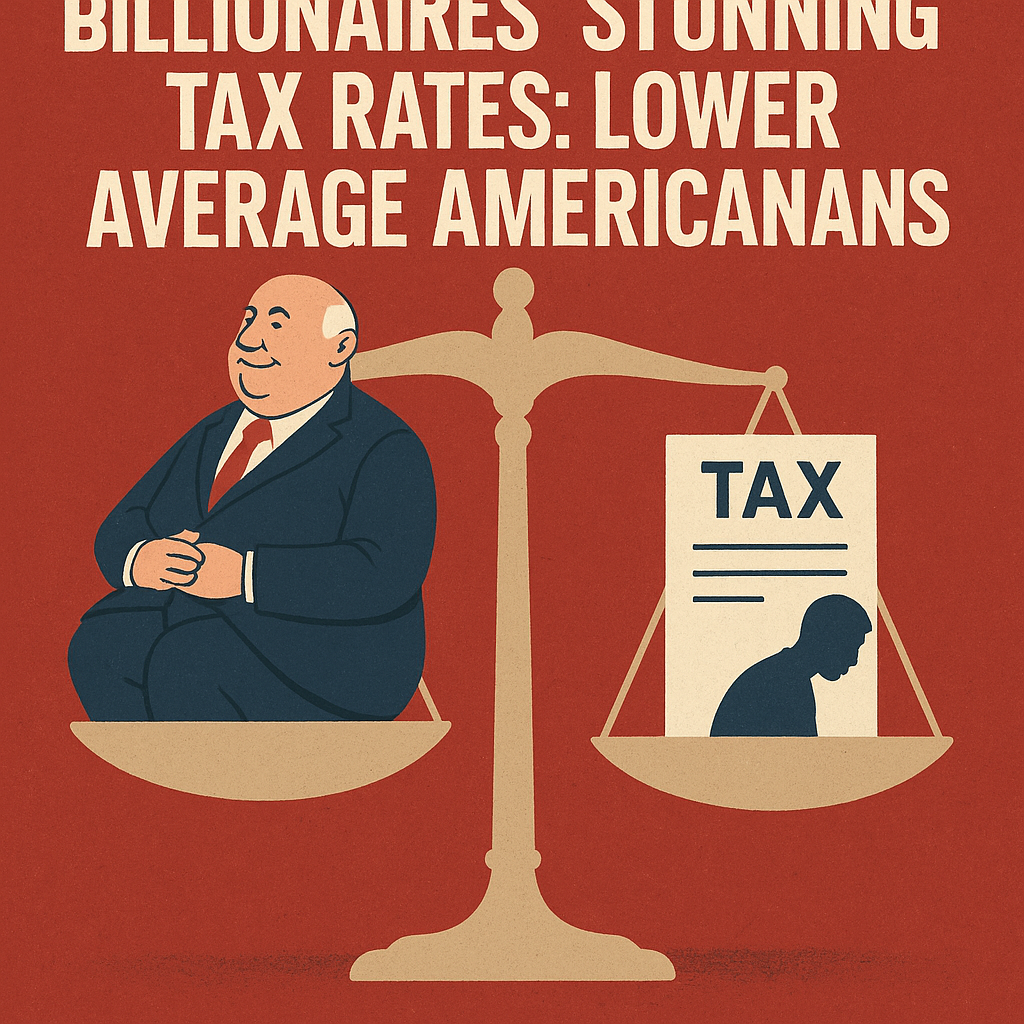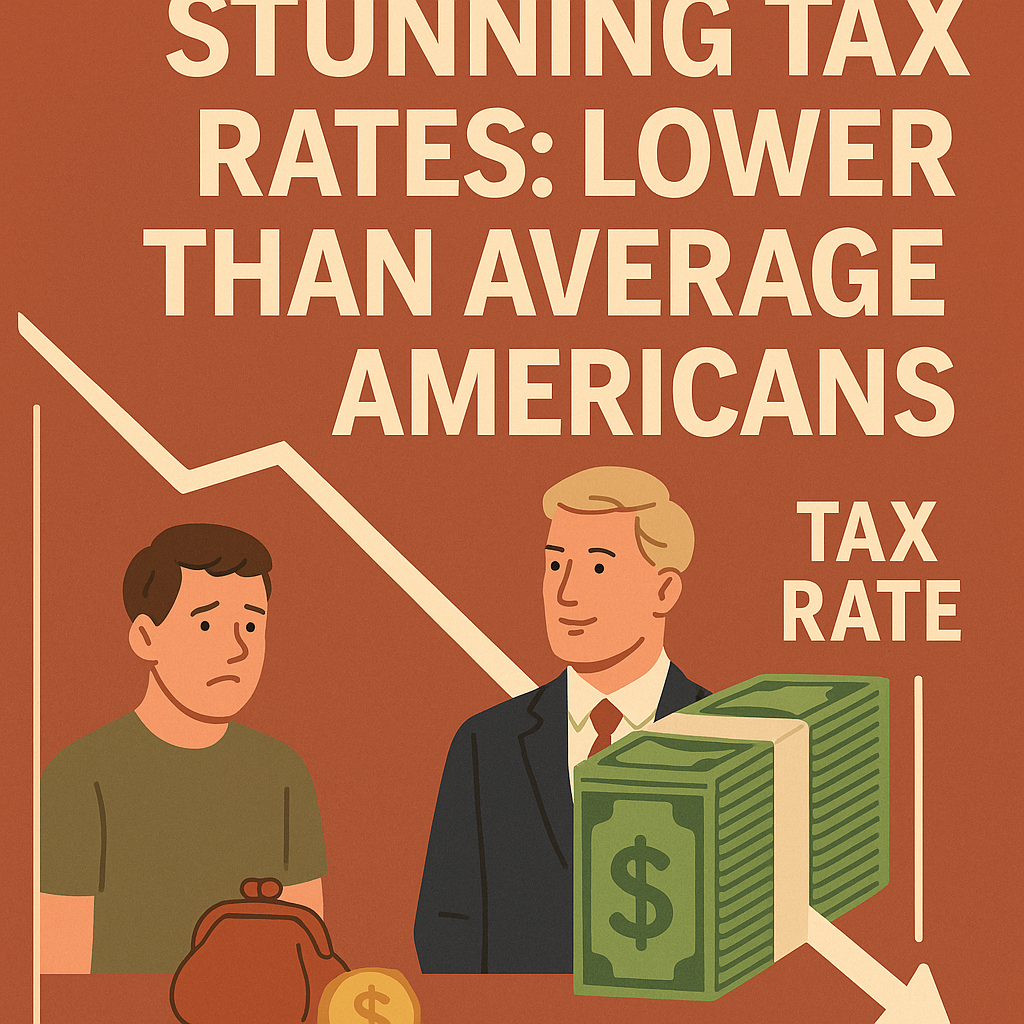Billionaires’ Stunning Tax Rates: Lower Than Average Americans
Billionaires’ Stunning Tax Rates: Lower Than Average Americans
Billionaires’ stunning tax rates reveal a glaring disparity in the financial landscape of America. As new data emerges, it is becoming increasingly clear that many ultra-wealthy individuals are paying effective tax rates significantly lower than those of average Americans. This phenomenon raises critical questions about tax equity, economic justice, and the sustainability of fiscal policy in the United States.
The Current Landscape of Taxation

Recent reports indicate that a substantial number of billionaires are benefiting from effective tax rates that fall below 10%. For instance, individuals like Elon Musk and Jeff Bezos have come under scrutiny for their low tax contributions compared to their vast fortunes. According to a study published by a reputable news outlet, while the average American might see tax rates hovering around 20% for federal income tax, many billionaires manage to utilize loopholes and tax strategies to pay far less.
A detailed analysis shows that these rich individuals often accrue their wealth through capital gains rather than traditional income. Since capital gains are taxed at lower rates, some billionaires effectively minimize their tax liabilities. This has led to an ongoing debate regarding the fairness of a tax system that seems to favor wealth accumulation for a select few at the expense of the broader population.
Diverse Perspectives on Taxation Disparities
The current discourse surrounding billionaires and their tax rates is far from one-dimensional. Proponents of wealth inequality often argue that high-net-worth individuals contribute significantly to the economy through job creation and investment. They suggest that imposing higher taxes on billionaires could stifle innovation and growth, possibly even leading to job losses.
Conversely, critics argue that the current tax system perpetuates social inequality and privileges the wealthy. A well-cited report from another news source highlights that when billionaires’ tax obligations do not reflect their actual wealth, it places an undue burden on average Americans. The idea is that essential public services, funded largely through tax revenues, ultimately suffer when the wealthiest citizens do not contribute their fair share.
In addition, economic data from multiple sources point to a growing concern that the tax system favors the wealthy at the expense of the middle class and the bottom-tier earners. These disparities have tangible impacts, affecting everything from public education funding to healthcare resources.
Weighing the Evidence: Calls for Reform
As public scrutiny mounts, policymakers are increasingly called upon to reassess the tax codes that govern these financial inequalities. Some lawmakers advocate for a wealth tax—a levy on the net wealth of individuals rather than merely their income. Supporters of wealth taxes argue that they could bridge the gap in tax contributions between billionaires and average citizens.
However, critics argue that establishing a wealth tax may pose administrative challenges and regulatory hurdles. Moreover, they question the potential impact on investments and economic behavior, fearing it may drive affluent individuals to relocate their assets overseas to avoid taxation.
Simultaneously, various grassroots movements have emerged advocating for fairer tax systems that eliminate loopholes and encourage billionaires to contribute a more equitable share. Notably, several petitions call for increased transparency in financial dealings among the wealthy, enabling greater public oversight on whether billionaires truly pay their fair share.
Conclusion: A Complex Conversation
Billionaires’ stunning tax rates invite a complex and nuanced conversation about equity and fairness in taxation. On one hand, the argument highlights the necessity of a tax system that equally distributes the financial responsibility amongst all citizens. On the other hand, it challenges the delicate balance needed to encourage innovation and economic growth.
While various viewpoints exist regarding this issue, it remains evident that reforms are necessary in the tax code to address these glaring disparities. The ongoing debate over billionaire taxes serves as a critical reminder of the intricate interplay between wealth, policy-making, and societal welfare. It is clear that sustainable solutions will require collaboration and dialogue from all sides to ensure that the tax system truly serves the interests of all Americans, not just the wealthy few.















